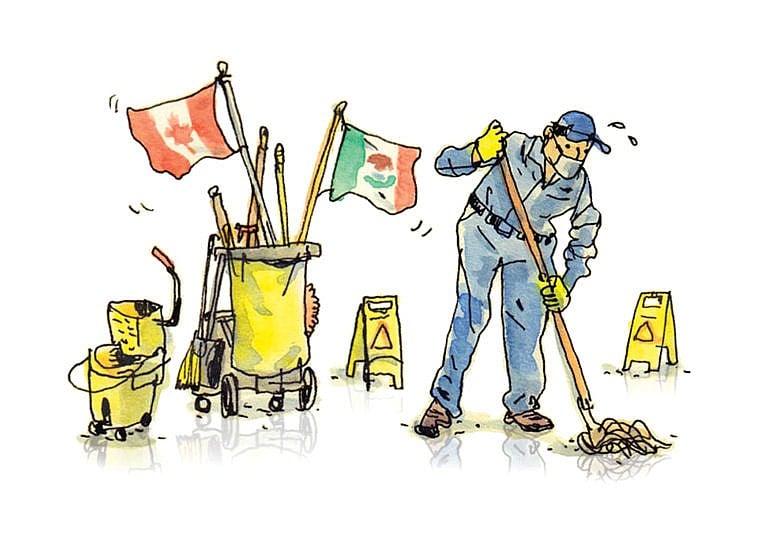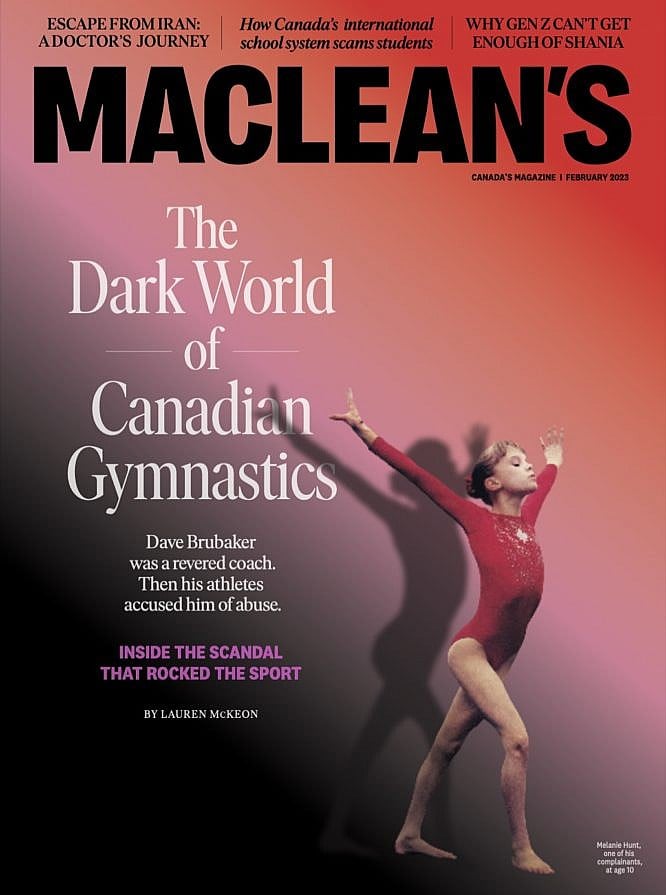I escaped Mexico’s cartels. Fourteen years later, the only work I can find is as a janitor.
“Every night, my wife and I ate a quick meal before cleaning buildings across the city”

(Illustration by Victor Kerlow)
Share
In 2008, the border town of Ciudad Juarez, where I lived with my wife and three children, was the epicentre of Mexico’s war on drugs. Each month, people were slaughtered by the hundreds. At the time, I worked as a senior correspondent for Grupo Reforma, an influential media company. In August of 2008, a reliable source warned me that I was on a cartel’s hit list in retaliation for exposing the corrupt relationships between government officials and criminal organizations. I’d spent many years as a reporter in a dangerous region; these threats were common.
Things escalated one September afternoon. I heard the front door slam and my wife yell for me to come downstairs quickly. I found her pale and shaking, pointing toward the street. She told me she’d been followed by two men in a minivan, who threatened her outside our house. The target on my back had finally moved to my wife and children.
We needed to escape as soon as possible. I didn’t want to go to the U.S. because I knew the cartel had tentacles there. Instead, we fled to Canada and claimed refugee status. During our first week in this country, we stayed in a hotel in the suburbs of Langley, B.C. Members of the Church of Jesus Christ of Latter-day Saints helped us move into an old semi-detached house in Delta and covered two months’ rent, also supplying some furniture and clothes. Every month, my wife and I left our home at 5:30 a.m. to secure a spot in line at the local food bank. We identified the best thrift stores in the area and which neighbourhoods left out furniture in good condition. My children received donated Christmas gifts.
READ: My family and I fled gang violence in Mexico and made a home in Canada
As refugee claimants, we spent our early months navigating provincial and federal offices, constantly relying on charity and governmental assistance to stay afloat. It took five years for us to transition from protected persons to permanent residents to Canadian citizens. Our temporary social security during the early years restricted our work options and left us taking survival jobs, like janitorial work. Back in Ciudad Juárez, my wife held a managerial position; in Vancouver, she worked as a housekeeper from 7 a.m. to 3 p.m. while I took care of our children and prepared the evidence file for our immigration hearings. We also worked together as janitors. Every night, we ate a quick meal before cleaning buildings across the city, often returning home at 2 a.m. While we were out, my eldest son put his siblings to bed. He was 17 years old at the time.
In 2011, my family and I moved to Toronto, where I completed two master’s degrees in the hope that they’d help me succeed in Canada’s workforce. After accumulating considerable student-loan debt, I was quickly disillusioned, one rejection email at a time. In 2015, the Toronto Star hired me as a content editor for the Star Touch app. After the project failed, I was among the first to be laid off. From there, another fellowship and casual gigs helped cover some of our family’s bills.
Things were hard. They got harder one cold morning in November of 2016, when my world stopped on the 12th floor of Mount Sinai Hospital. A doctor’s soft voice informed me that my wife had cancer, a rare type of sarcoma on her left leg. My children grew up knowing my work was dangerous. Suddenly, we had a new threat to our family. Eleven rounds of chemo, 22 sessions of radiation and two major surgeries later, my wife was in remission. At last, a triumph.
MORE: When I moved to Canada from Syria, I could finally be myself
Last September, I signed a contract to work as a part-time weekend janitor at a Toronto supermarket. I was thought to be too unqualified to work for the government and too unskilled to join a private company, even with my master’s degrees. The circle came to a close—another painful reminder of time spent looking, unsuccessfully, for a better future.
Fourteen years after moving to Canada, I’m still trying to find work that makes use of my education. I’ve published a book about organized crime and continued to write dozens of cover letters and resumés, though I’m always rejected. I keep searching for a way to repay this country as an educated immigrant, experienced professional and grateful refugee. All I ask is to be allowed to give back with all that I am.
This article appears in print in the February 2023 issue of Maclean’s magazine. Buy the issue for $9.99 or better yet, subscribe to the monthly print magazine for just $39.99.
